Healing is a journey, not a destination. Learn the truth about victimhood and discover the empowering path – from victim to survivor to thriver!
No doubt, humanity has experienced a vicious cycle of victimhood throughout recorded history, and although many of us have been victims of abuse, crime, or disempowerment, the dynamics that perpetuate victimhood remain hidden.
Therefore, before we can end the cycle of abuse and heal emotional trauma for ourselves and others, we must dispel the false perceptions that perpetuate disempowerment.
In fact, the truth about victimhood cannot only heal you, but it can also set you free!
Victim vs. Perpetrator
On the surface, all abusive relationships and disempowering dynamics consist of at least one victim and one perpetrator, and while the victim remains blameless, the dynamics of abuse and disempowerment are blamed entirely on the perpetrator.
However, under the surface, this deceptive perspective actually perpetuates victimhood.
For the sole purpose of providing deeper insight, I’ve decided to share the details of my own journey from victimhood to victory. So, rather than just telling you what I discovered, I’m going to show you how I discovered it.
Be warned, if you’re not ready to release the idea of victimhood, the following perspective could invoke a strong emotional reaction.
Truth About Victimhood: How To Heal Emotional Trauma
Shortly after I ran away from a dysfunctional home at sixteen-years-old, I found myself in a horrifically abusive relationship.
Through the hands of a violent boyfriend, I was suffocated, strangled, and nearly beat to death every day for several long months, and even thrown out of moving cars on more than one occasion.
Related: The Victim Identity: 4 Ways To Recover
After being terrorized into complacency, my “abuser” made it perfectly clear that if I ever left him, he would hunt me down and kill me like prey, and, if verbal threats weren’t convincing, each time I attempted to leave, his actions left no room for doubt.
Seeing myself as a helpless victim of abuse and paralyzed by fear and worthlessness, my perpetrator had the power to choose my fate, and, as a result, I was prepared for the worst.
After nine long months of escalating abuse, death appeared to be the only plausible escape, and, yet, in my darkest hour, I experienced an unexpected glimpse of hope.
Although I began to envision a future beyond victimhood before I could save myself, I had to consciously choose life, and this meant that I had to overcome a deep sense of worthlessness.
No doubt, the battle ahead would not be easy, and because my abuser would rather kill me than let me go, I had to face the dire fact that in order to save my own life, I had to risk losing it.
Even though this might make me sound like a strong and brave kid, I was barely hanging on, and with absolutely no support, I was fragile and terrified!
Any resources I once possessed were long gone, and, yet, I could not save myself while believing I was powerless. In fact, if I had any chance of rising above victimhood, I had to stop playing the victim.
Related: 5 Sneaky Ways A Narcissist Uses a DARVO Defense to Project Himself As A Victim
So, with no other choice, and with only will-power and courage as ammunition, I was determined to rescue myself. Somehow, I would have to fight and win a personal revolution!
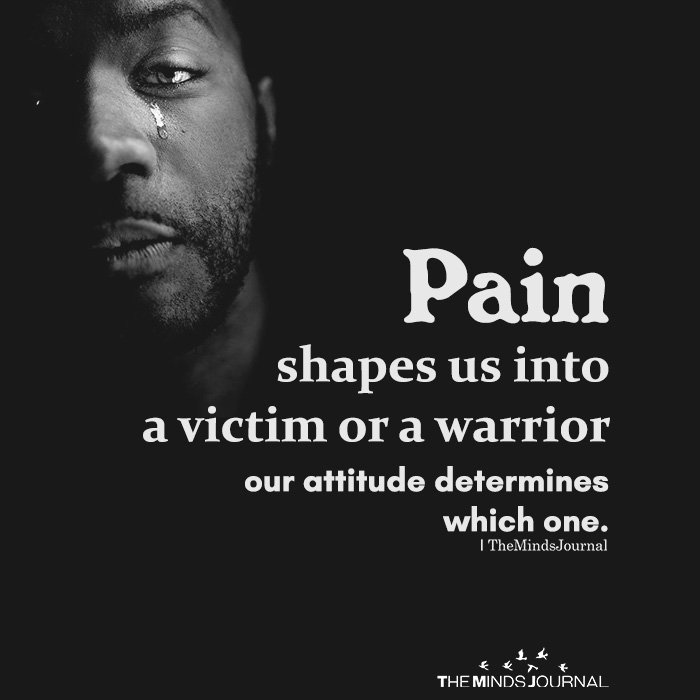
Fortunately, I’m happy to say that, despite a brutal and almost deadly escape, I ultimately survived – no doubt, with the help of divine intervention!
Revolution to Revelation
Even after I was physically free from abuse, deep emotional scars, and unhealed trauma held me captive for years, and, as a result, the healing process took time to complete. Nonetheless, I eventually graduated from victim to survivor!
However, at some point, I realized that in order to be a survivor and tell my riveting “survival story,” I had to keep identifying as a victim, and this meant that the “survivor mentality” kept me trapped in victimhood.
Related: Surviving A Manipulator and Restoring Your Sanity
However, even after I stopped identifying as a survivor, I still continued to believe that my past “abuser” was guilty of wrongdoing and I was the innocent victim, and because I was innocent and he was guilty, I believed that I was the better person.
Consequently, when I was finally able to forgive him for his atrocious acts against me, the act of forgiveness boosted my ego; “Look at me; I’m so great because I forgave the bad person who hurt me!”
Nevertheless, I forged the path of forgiveness and I went on to live a wonderful life….
Many years passed, and even though I thought everything was done and healed, unanswered questions still haunted me; Why did I have to experience abuse and victimhood in the first place, and, furthermore, why does anyone have to endure such pain and torment?
When reputable books and experts in various fields failed to offer complete answers to these perplexing questions and many others, I looked within for answers, and, consequently, I asked my Higher Self to show me a higher truth about the abuse and victimhood.
Related: Are You Being Emotionally Abused By A Sociopath? Here’s What You Need To Know
Filled with paradoxes left and right, the multidimensional truth was not only complex, it was incomprehensible at first. Before I could perceive a higher truth, I had to create the space to receive.
So, as I disentangled from mental and emotional constraints and I cleared the distorted lens of human perception, I became more and more receptive to varying points of view, and as my consciousness expanded, my ability to perceive grew too.
Finally, with no filters to cloud my vision, an omnipotent vantage point revealed the Highest Truth – and this truth set me free!
Now, from me to you, the condensed version goes like this….
Trauma or Drama – Life is a Grand Stage!
As your True Self, you are unconditionally worthy and intrinsically powerful – and so is everyone else. Although this may sound awesome, there’s a downside to omnipotence.
You see, to an all-powerful soul like you, there are no challenges to overcome nor adventures to experience, and, therefore, in order to compensate, you were born with amnesia.
Related: How Childhood Trauma Impacts our Physical, Emotional and Relational Health
Indeed, life is a temporary stage where you act out your stories and issues, and since there’s no risk of permanent harm, you can play any part or endure any challenge.
Regardless of drama or trauma, when your human form expires, you inevitably wake-up as your True Self, and while completely unscathed and perfectly whole, you’re actually better for the experience and no worse for wear!
You Create Your Own Reality
Even with amnesia of your True Self, you are the creator of every experience throughout life, and, whether conscious or unconscious, your beliefs create your reality. In fact, by demonstrating your beliefs, life operates as a perfect feedback system.
This means that as you project individual beliefs onto the 3D movie screen called “life,” those beliefs manifest as real-life circumstances – specific to you.
Since positive beliefs manifest as positive experiences and negative beliefs manifest as negative experiences, the underlying cause of disempowering circumstances is virtually always one or more corresponding beliefs.
Therefore, when someone has beliefs regarding powerlessness, those beliefs inevitably manifest as disempowering experiences and even victimhood.
Related: 11 Limiting Beliefs That Are Holding You Back In Life
Even though the perpetrator and victim appear to be opposing forces, they are actually two parts of one single dynamic.
Attracted to one another through complementary beliefs, the victim and perp are unconsciously drawn into an abusive dynamic.
For instance, people pleasers and narcissistic personality types are often attracted to one another because their beliefs are complementary.
While people pleasers often believe that their worth depends on pleasing others (to gain approval or acceptance), narcissists often believe that their worth depends on validation or proving superiority.
Hence, when one person needs approval or acceptance and the other desires superiority or control, it sets the stage for disempowerment, and, over time, the relationship may become abusive.
Related: How Our Thoughts and Reality Don’t Always Match: What You Should Know
However, this type of dynamic is not due to karma nor punishment, but, rather, it exists so that each participant can identify and release disempowering beliefs.
Playing the Perp via Soul Agreements
Just like every perpetrator needs a victim, every victim needs a perpetrator, and, therefore, to experience victimhood, someone has to play the part of the perp.
Although people with complementary beliefs are naturally drawn together, this attraction is rarely random, but, rather, in conjunction with pre-life agreements.
Agreeing to act out our beliefs on the stage of life, our very best eternal friends often play the parts of our worst human foes, and through a mutual agreement, we play appropriate counterparts.
This means that when we experience victimhood, the part of the perp is often played by a loving soul. Apparently, for me, this was clearly the case.
In fact, when I asked to see a higher truth, I was shown that prior to meeting my “abusive boyfriend” in high school, I subconsciously believed that I was unworthy and powerless, and this set the stage for victimhood.
Consequently, by fulfilling a pre-life agreement to wake me up early in life, he acted out my disempowering beliefs.
However, if I did not believe that I was both unworthy of love and also deserving of abuse, he never could have played the perpetrator who victimized me, and, if I did not believe that I was powerless, the abuse never could have escalated to such heights.
Related: 5 Fundamental Truths I Learned About Life In My Journey As An Empath
How To Move From Victim To Survivor To Thriver?
Since life is a feedback system, if someone does not have beliefs about victimhood or powerlessness, there’s no need for a perpetrator to act them out, and, in fact, without a person having these beliefs, a perpetrator cannot act them out!
In fact, no one can ever do anything to you (externally) that you first don’t do to yourself (internally via beliefs).
Through our own disempowering beliefs, we imprison ourselves from the inside-out, and by releasing the beliefs that trap us in disempowerment, we free ourselves, and, at the same time, we free those who play our perps!
While unconsciously playing the part he agreed to play, my “volunteer perp” beat me senseless until I woke up and rose above my own disempowering beliefs! By fulfilling our soul agreement, I was forced to claim my power and worth, and once I did, our agreement was complete. Therefore, as I saved myself, Hal was released from the part he played for me!
The truth is, I survived victimhood to discover that I was never really a victim!
Since beliefs create your reality, your beliefs make you the creator of every experience, and as the creator, you are responsible for your own disempowering circumstances, and this means that you can never be a victim.
Keep in mind that although no one has power over you or your life, if you believe someone does, you could prove yourself right.
From this Grand View, can you begin to see how the “victim” creates his or her own reality?
Maybe you’re thinking if this is all true, why do children experience abuse? Well, keeping in mind that an all-powerful soul lives within every child, early childhood experiences often represent specific beliefs that our souls want to experience and overcome.
Healing Power From The Cycle Of Abuse
No doubt, in order to heal the trauma of abuse and victimhood, we must release the disempowering beliefs at the cause.
Moreover, all emotional wounds and unhealed emotional trauma funnel down to one or more of three disempowering beliefs (powerlessness, unworthiness, and victimhood), and, therefore, these are the beliefs we must identify and release.
Related: My Journey Of Healing: Facing Every Difficult Emotion Head-On
Additionally, since victimhood is transcended through the expression of power, we must also embody our power through tangible demonstration, and this means that our actions, behaviors, and choices must demonstrate self-empowerment.
Evidenced by speaking one’s truth, setting and enforcing boundaries, taking actions that overcome fear, etc…
Looking back on my courageous escape, not only did I have to believe that I had the power to save myself, I had to prove that I could!
Clearly, it’s impossible to be both a victim and self-empowered at the same time, and, therefore, if victimhood creates a sense of identity (as it often does) before we can be fully empowered (and heal), the victim identity must be dropped.
As the bridge from victimhood to victory, self-empowerment is key! However, self-empowerment is relative to self-responsibility, and this means that we must take full responsibility for the experiences caused by our beliefs.
So, before I could fully heal the emotional trauma of victimhood, I had released the belief in powerlessness, and not only did I have to stop identifying as a victim, I also had to claim responsibility for my own victimhood – and this meant relinquishing blame.
Say “No” to Blame!
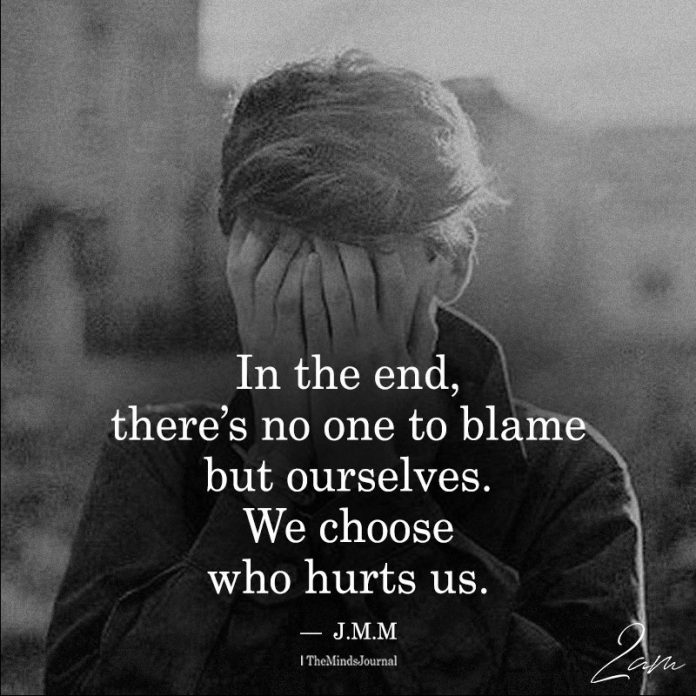
The act of blame is only possible when we believe that we are powerless and someone has (or had) greater power. However, the hidden cost for shifting responsibility (via blame) is our own disempowerment.
Regardless of past or present circumstances, each time we project blame, we give our power to the one we blame, and because we need this power to heal, our emotional wounds deepen with age.
While feeding our own powerlessness, the act of blame perpetuates victimhood, and by blaming another, we project the power needed to heal!
Related: 2 Reasons Why The Abuser Blames You Even When You Are The Victim
No matter how you look at it, shifting responsibility inhibits healing and perpetuates unnecessary suffering.
However, let’s be clear; although you must take responsibility for the unconscious beliefs that result in disempowering circumstances, this does not mean that you are deserving of mistreatment nor were you ever deserving, and, therefore, there’s absolutely no reason for shame.
By claiming responsibility for disempowering circumstances, you activate your intrinsic power – and this power allows you to heal!
Metaphysical Alchemy
Whether we realize it, or not, we are always 100% responsible for every experience and this means that we are never really powerless. However, as long as perception is filtered through shame, regret, guilt, blame, resentment, etc…, it’s impossible to see the full picture nor comprehend the higher purpose of challenging experiences.
Therefore, before we can understand how or why we created disempowering relationships, emotional trauma, or painful experiences, all limiting interpretations of the past must be questioned – and the filters of misperception cleared.
Just like “metaphysical alchemy,” the wisdom of the ages healed me from within, and once Universal Truth illuminated my disempowering beliefs, I was awakened and set free!
Now, with unclouded vision, it’s perfectly clear to see that I was never really a victim, and, in fact, Hal enacted the part best suited for him and me, and, instead of being motivated by hate, as I once believed him to be, it’s now clear to see that he played the perp out of love for me!
Related: Choose an Alchemical Symbol – Find Out what Your Spirit Thirsts for
Although I would not attain this level of clarity for many years, the moment everything came into focus, the idea of forgiveness dissolved into enormous gratitude! Although I never got the chance, if I could, I would say, “Hal, thank you for waking me up – and making me save my own life!”
By looking beyond the obvious, the illusion begins to dissolve, and if we allow the truth to come into full view, we can begin to see that every victim holds the key for victory!
Copyright: Nanice Ellis 2019. All rights reserved
Did you enjoy reading about the truth about victimhood? Leave a comment below if you have a story to share about the cycle of abuse.
Written by Nanice Ellis Originally appeared in Wakeup World
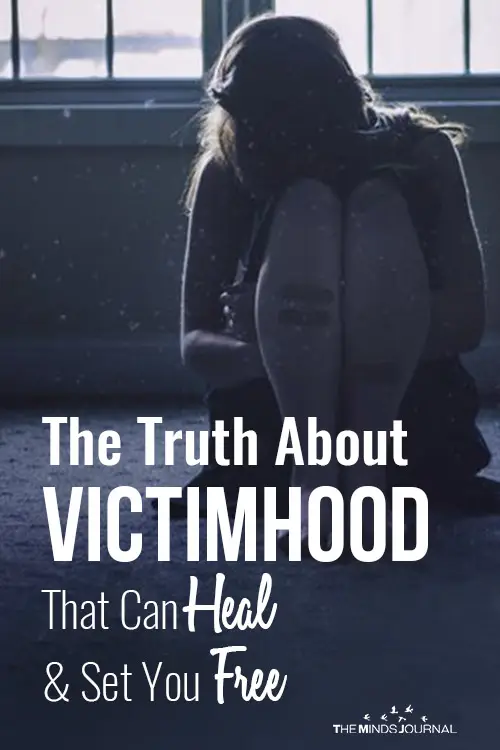
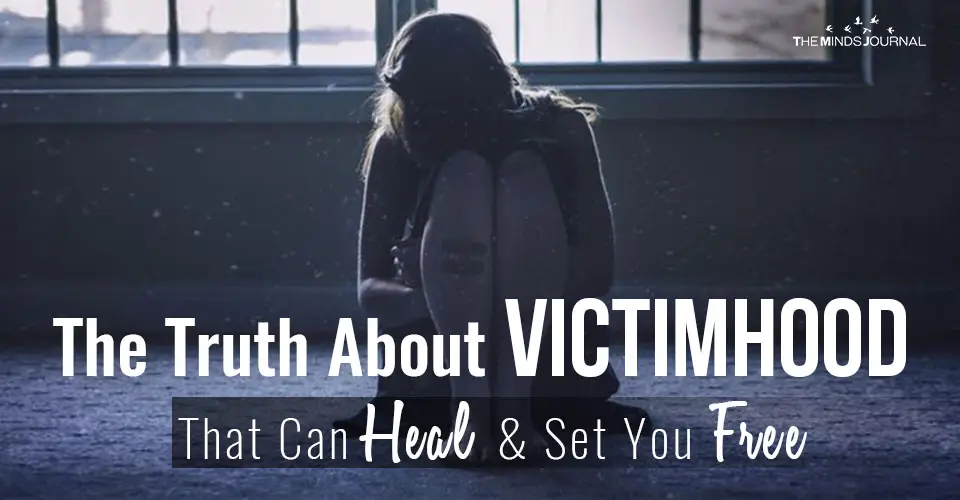





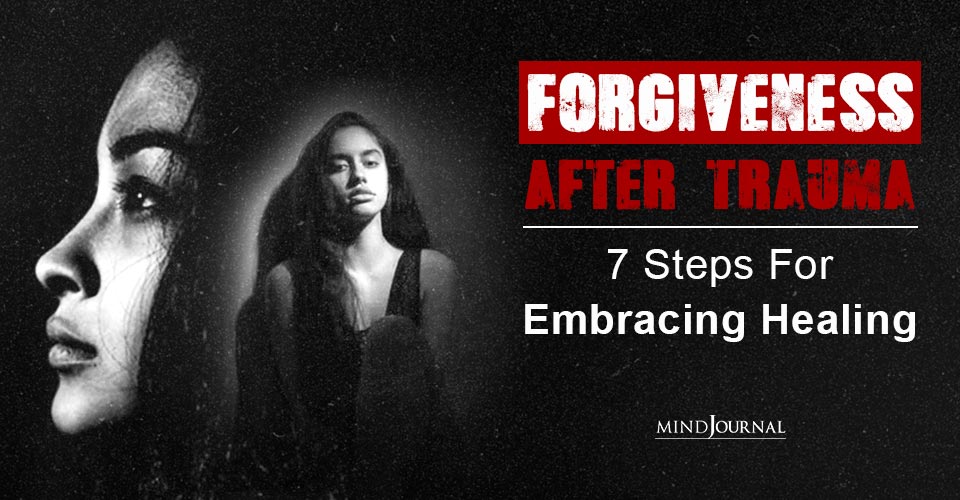

Leave a Reply
You must be logged in to post a comment.